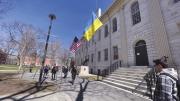When he was president of Harvard, Neil L. Rudenstine made the case for universities’ role as custodians of human histories, cultures, and languages by telling a story from his service as provost at Princeton. In 1979, following the Islamic Revolution and the creation of Ayatollah Ruhollah Khomeini’s government, a Princeton friend who was leading the investigation into the legal case against the seizure of the U.S. embassy that November called one evening. The lawyers needed access to many sources on Iran, especially Khomeini’s books, and knew Princeton had an excellent Near Eastern studies library; could they come down from New York to have a look? Although it was about 11:00 p.m., Rudenstine said yes. They arrived, he got the library opened, the lawyers found everything they sought (including volumes with pages still uncut—never needed until then), he checked the volumes out, and off they went into the darkness—equipped, as it turned out, with exactly the references they required.
Until last fall, perhaps, one might have wondered why Harvard needed a Ukrainian Research Institute, founded in 1973, as its website explains, with financial support from the Ukrainian-American community. Now, tragically, its importance is unmistakably clear. During an interview with The New Yorker’s Isaac Chotiner published on February 23, institute director Serhii Plokhii, who is Hrushevs’kyi professor of Ukrainian history, firmly established the Ukrainian identity that Vladimir Putin dismisses: “If you are talking about language, that would be pretty much primordial. In terms of an identity with religious components, that would be more than a thousand years old. But the first modern Ukrainian political project started in the mid-nineteenth century, as with many other groups.” What did he envision if Putin launched a war? Given the experience since the Russian attack in 2014, Plokhii said, “Thousands of people went through military training, and they will fight. I don’t know when and how, but I have no doubt that there will be resistance.” The next morning, of course, Putin committed to bloodshed.
In a February 25 message to Plokhii and Tymish Holowinsky, the institute’s executive director, President Lawrence S. Bacow said, “I have been reading the news in disbelief this week, and I wanted to write to let you know that I am thinking about you—and your colleagues and students—as the capricious and senseless invasion of Ukraine continues.” During a March appearance in London, he observed of the invasion that “It’s important that the world takes note, as it has”—and he told the Faculty of Arts and Sciences that he had asked that the Ukrainian flag be flown alongside the U.S. one at University Hall. But Bacow also reminded the community that “institutions like ours influence the world largely through our teaching and scholarship.”
The institute led nearly nonstop campus discussions of every aspect of the war. Experts from the Davis Center for Russian and Eurasian Studies, the Kennedy School, and its Belfer Center for Science and International Affairs and Ash Center for Democratic Governance and Innovation weighed in. There were forums on Russia-China relations in the wake of the war (see harvardmag.com/saich-on-invasion-22), and on the prospects for a second Cold War—or worse (see harvardmag.com/second-cold-war-22).
Of course there were more personal actions, too. Oleh Khalayim, M.P.A. ’04, vice president of the Harvard Club of Ukraine, wrote about joining the army once the invasion began February 25, queueing up for service as a reserve captain. Alumni Association president Vanessa Liu ’96, J.D. ’03, circulated the club’s registration form for alumni who can offer employment to refugees. The ukrainetakeshelter.com website, created by Avi Schiffmann ’25 and Marco Burstein ’25, provided a utility to link refugees with hosts and housing.
And in a crushing example of what is at stake, videographer Brent Renaud, a 2019 Nieman Foundation fellow, was killed by Russian soldiers in Irpin, outside Kyiv, on March 13, while reporting on the refugees fleeing the fighting and bombardment (read about the Nieman memorial service at https://news.harvard.edu/gazette/story/2022/03/brent-renaud-remembered-by-fellow-journalists).
Remote though the devastation unleashed on Ukraine is from the safety of Harvard’s campus community, the institution and its people have responded: intellectually and academically, reflecting the University’s resources and mission, and personally, as fellow human beings sickened by the attack. As members of a community committed to curating cultures and preserving histories from around the world—an institution that was irrevocably changed by the fallout from the war that last engulfed Europe—Harvard people were also aware, as Bacow put it, that “At a visceral level, this feels almost like 1939 all over again.”









